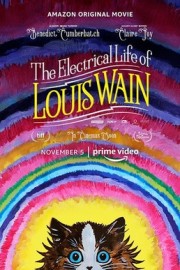The Electrical Life of Louis Wain
There are many stretches of this film that are entirely what connects with me about a very good biopic. Louis Wain, as written by Simon Stephenson and director Will Sharpe, is a character Benedict Cumberbatch we’ve seen before from the actor- a brilliant, complicated individual whose life has almost as much controversy as it does enjoyment. Wain is an individual worthy of biopic treatment, and Sharpe has a unique cinematic experience in store for us. When it dives deep into cliche, however, in both approach and narrative, the film loses the magic it wants to accomplish.
There’s a part of me that understands the use of narration in “The Electrical Life of Louis Wain.” It gives us both an outside perspective on the story being told, and has an ability for Sharpe to allow us a glimmer of Louis Wain’s internal perspective. (That the narration by Olivia Colman certainly helps.) More than that, it gives Sharpe’s film the sense of a whimsy and fable, which is a mixed bag. Certainly, Wain’s ideas on electricity, and the obsession with cats that drove some of his most famous work, is whimsical and delightful. When his film wants to get heavy, though, it almost isn’t comfortable doing so.
A traditional look at the life of Louis Wain, whom was forced to be the patriarch of his family- including his mother and many sisters, whom married his sisters’s governess (played by Claire Foy), could have been drab and uninteresting. Sharpe uses some lovely cinematography by Erik Wilson and production design to create a world for Louis to live in that captures the authenticity of the period while also giving a sense of imagination that will inspire Wain as he moves through his creative endeavors. The thing that really sells this film from an artistic standpoint, though, is the score by Arthur Sharpe, which uses a theramin-esque sound that further enhances the emotional landscape Wain lives in, arguably, much better than the narration does.
If you find yourself thinking of Cumberbatch’s performance as Alan Turing in “The Imitation Game” throughout the film, I would not be surprised. Wain in the film has a similar arc of outsider who becomes invaluable to society until they aren’t any longer. Cumberbatch is capable of playing this sort of character in his sleep, and he does a fine job. He has wonderful chemistry with Foy, and their arc together is beautiful and heartbreaking. As one of his sisters, Andrea Riseborough is one of the bossy centers of his personal life, and Toby Jones is a supportive, but realistic, source of income. Cumberbatch and Sharpe’s vision of how Wain’s life moves from struggle to struggle, while also giving him moments of peace and genius. This type of arc always resonates with me, because I feel as though my life has had similar highs and lows. The end of the film gets to some of the saddest parts of Wain’s life, and while some moments work, it also feels cloying and tries to be a bit too “inspiring” when it should be illustrating the unfortunate realities of his life.
Here I am, four paragraphs in, and I haven’t really discussed what made Wain so famous. He had a prodigious artistic talent that came alive after he and Emily (Foy’s character) bring home Peter, a cat. Peter unlocks something in Wain, and his cat pictures were all the rage. Unfortunately, like a lot of artists, he doesn’t have a lot of business sense, and part of his struggles are self-made as a result. He also has some interesting ideas with electric energy, but that starts to make more sense when we start to see the emotional struggles Louis Wain deal with. When the film focuses in on some of those as it goes on, “The Electrical Life of Louis Wain” is heartfelt and emotional. That’s when it captures the imagination and soul of its main character.










